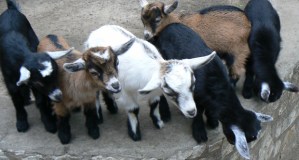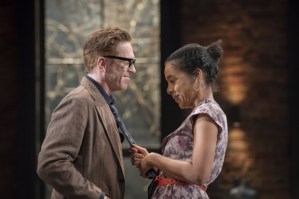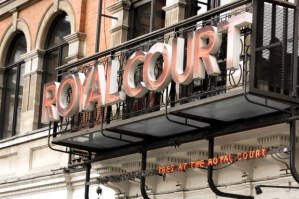Liwaa Yazji: 'Goats is an opportunity to offer a different view of Syria'
The Syrian writer of a new play soon to open at the Royal Court explains more about her piece and why having real-life goats starring was very important
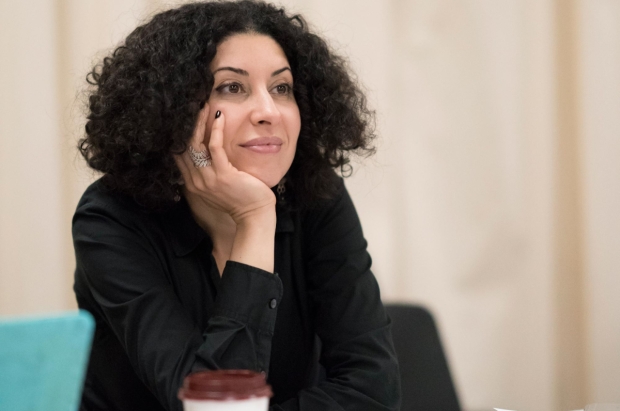
© Johan Persson
It’s rare for a theatre institution like the Royal Court to throw caution to the wind and cast a band of four-legged friends in its new show. But, with its upcoming piece Goats, it has. And who is behind this flight of fancy? None other than Syrian writer Liwaa Yazji whose piece is set in a small town in her home country where, during wartime, propaganda is rife and dead bodies keep coming home to grieving families. Goats has been developed as part of the theatre’s long-term focus on international writers and is Yazji’s first piece at the Royal Court. Her other work includes documentary Haunted, play Here in the Park and a book of poetry called In Peace, we leave Home. Here she tells us more about Goats.
So the play isn’t exactly about goats, is it?
It is set in a village during the last years of war. It is about a community that is bound with propaganda then one man questions the truth of the customs of the soldiers who come back to the village. He also wants to see the body of his dead son, and that’s where everything really unravels.
And the goats are given to the grieving families by the government – is that as a kind of bribe?
I wouldn’t give any judgement over that, about whether the goats are a bribe or compensation for their loss. I’d leave it to the people to decide. The whole piece is about what is good and what is bad during war – and how we can really know the difference.
Is it based on a true story?
The play isn’t, but certain things within it are based on things that actually happened. So some of the more surreal things come from real incidents that took place in war time. But the characters and the people and how the story develops – all these are fiction.
There are live goats in this production – had you always known you wanted live goats?
When I was writing it I was definitely thinking of the real thing. I think not having real goats would offer another layer of reading or approaching the play which is not what I wanted. I am lucky that we have a director who really believed in that solution. He said any other metaphor or practical application of the goats would give a different meaning.
How have the goats been in rehearsals?
Fine! They are so well behaved. The handlers tell us they are animals that enjoy being around people so they aren’t frightened. They are just really lovely, they hang around eating and enjoying the company.
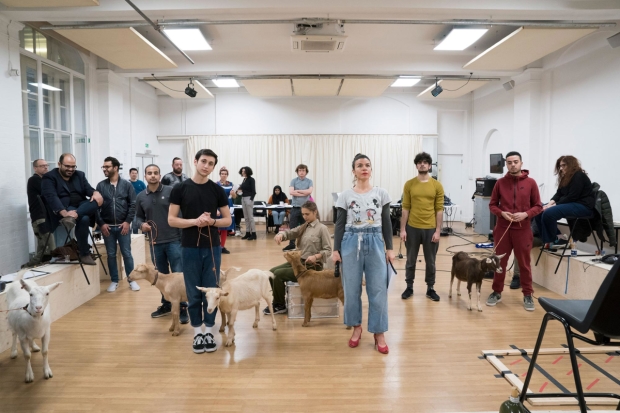
© Johan Persson
How did you first come to make a connection with the Royal Court?
I found out about the international playwright programme when I was in Lebanon in 2013 when they did their New Writing Project with the British Council. That was when I did the first scene of the play. Then we did a reading in 2015 in Beirut and later a reading of the play in 2016 at the Royal Court.
Had you always thought it would be played in London?
No, when I was writing it I wasn’t thinking it would be produced in London. But after the reading in 2016 I began to think about how this play would be perceived by an English audience. In Arabic I have a shorthand, I use references people would get immediately. But I needed to redraft some parts of the play with an English audience in mind. I had to look at whether I was writing for people who share the same information as me or writing something to be understood by a broader amount of people. I needed to consider the difference between the worlds.
Which was presumably pretty hard?
Yes, it was difficult searching for the ground inbetween, where you don’t spend the whole time explaining things.
There aren’t a huge number of voices like yours on the British stage at the moment, do you see this as an opportunity to open people’s eyes up to Syria?
I am so glad to have the chance. I really am. I see it as a responsibility, a moment to address a different audience. We are drowned by ideas about Syria and refugees and bombing in the media, so to come up with a different view, my own view, is really important.
How did you come to playwriting?
I studied theatre. I did English Literature and then I did Theatre Studies. It took a long time for me to understand what part of theatre I belong to, and what part of the broader sense of drama I belong to. I worked for a long time as a dramaturg and I tried so many things in the theatre process. I knew it was only a matter of time before I would sit down and do my own writing.
Do you come from a family with a theatre background?
Actually no. My father comes from the fine arts and my mother is a gynaecologist – a very different kind of stage and audience! We went to theatre, but it was the moment I started going to stuff on my own, when I had the money to go to theatre, that I really began enjoying it.
You’ve worked on both the Syrian and the London theatre scene – are they very different?
There’s a huge difference. We have national theatre, but we don’t really have private companies. In Syria everything is more nationalised. The infrastructure, the money funds, the subsidies are all different. In Syria you work for two months on the play, you don’t have reviews, you just have one open rehearsal for an audience, which is not paid for, then you have around 21 shows in total. Also in Syria the theatre publishing is different. You publish the whole play regardless of the production, but here, you publish the cut version of the play – the play that’s on in the first production.
Goats runs at the Royal Court from 24 November to 30 December.


